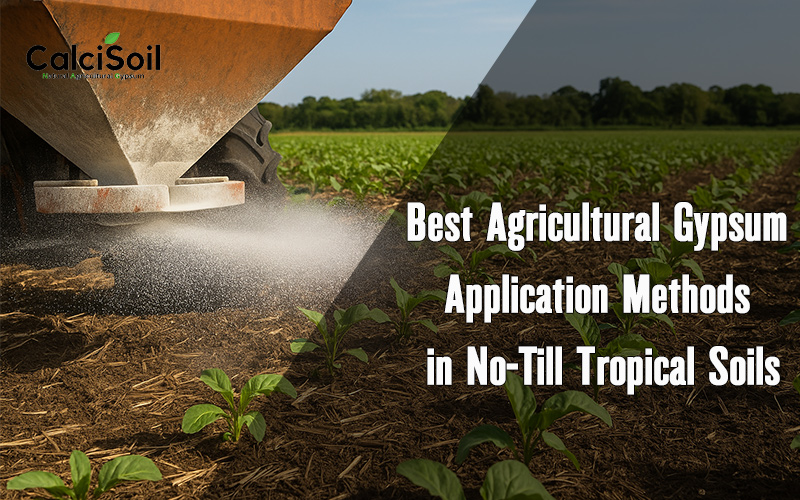Best Gypsum Application Methods in No-Till Tropical Soils

Understanding the Role of Agricultural Gypsum in No-Till Farming In tropical agriculture, soil health is one of the biggest challenges for farmers. High temperatures, heavy rainfall, and naturally weathered soils often lead to nutrient loss, increased acidity, and poor structure. For farmers using no-till systems, these challenges are amplified, as there is no traditional tillage […]
Mineral Gypsum vs FGD Gypsum: What Farmers Should Know

Understanding Agricultural Gypsum In the world of modern agriculture, soil health has become one of the most important factors influencing long-term productivity. Among the many tools available to farmers, agricultural gypsum stands out as a proven amendment that enhances soil structure, supplies essential nutrients, and reduces nutrient runoff. However, not all gypsum fertilizers are the […]
How Agricultural Gypsum Reduces Phosphorus Runoff & Improves Soil Health

Phosphorus is essential for crop growth—but when it escapes from farm fields into nearby rivers and lakes, it can trigger serious environmental issues. Algae blooms, poor water quality, and fish die-offs are just a few consequences of phosphorus runoff. Fortunately, there’s a powerful, natural solution that more farmers are discovering: agricultural gypsum. In this article, […]
How Gypsum Interacts with Organic Matter: A Guide to Better Soil Structure

Introduction: The Foundation of Fertile Soil Healthy soil is more than just dirt—it’s a dynamic, living ecosystem. The key to productive gardening and farming lies in balancing two crucial components: mineral structure and organic life. On one hand, we have gypsum (calcium sulfate), a mineral amendment that enhances soil structure and nutrient balance. On the […]
Gypsum in Sandy Soils | An Underrated Solution for Light Soils

The Overlooked Challenges of Sandy Soil While clay soils often dominate discussions around soil improvement, sandy soils present their own unique set of problems—many of which are silently sabotaging plant health. Loose, fast-draining, and easy to dig, sandy soil may seem ideal at first glance. But beneath that surface simplicity lies a deeper issue: sandy […]
How Agricultural Gypsum Can Transform Urban Gardening Soil

Introduction: Urban Gardening’s Hidden Soil Problem Urban gardening has become more than a trend—it’s a lifestyle. From balconies and rooftops to compact courtyards, more people are growing vegetables, herbs, and flowers in tight spaces. But while containers and raised beds offer convenience, they often come with one major challenge: poor-quality soil. Most urban soils are […]
Gypsum for clay soils: Advanced Tips & New Considerations

Advanced Tips for using gypsum for clay soils Clay soil, notorious for its dense, compact nature and poor drainage, presents significant challenges to both gardeners and farmers. Gypsum (calcium sulfate dihydrate) is frequently used to improve such soils. However, the real question many overlook isn’t why to use gypsum—but how much, and under what conditions […]
9 Expert Tips to Choose the Best Agricultural Gypsum

Choosing best agricultural gypsum Agricultural gypsum (calcium sulfate dihydrate, CaSO₄·2H₂O) is a powerhouse soil amendment widely used to improve soil structure, boost calcium and sulfur levels, reclaim sodic soils, and enhance water infiltration. However, not all gypsum products are created equal — and selecting high-quality agricultural gypsum can make a significant difference in how effective […]
How Gypsum Affects Crops in Hot and Dry Climates

In hot and dry climates, where agriculture faces unique challenges like water scarcity, soil degradation, and nutrient imbalances, gypsum—calcium sulfate dihydrate (CaSO₄·2H₂O)—emerges as a valuable tool for farmers. Known as agricultural gypsum, this naturally occurring mineral has been used for centuries to improve soil conditions and boost crop productivity. Its benefits are particularly pronounced in […]
Understanding Soil Permeability: Key Factors and Improvement Techniques

Permeability of Soil in Different Soils and Situations Soil permeability is a crucial property that determines the rate at which water and air can move through the soil. It influences agricultural productivity, construction stability, and environmental management. Understanding the permeability of different soil types and how it changes under various conditions is essential for effective […]

